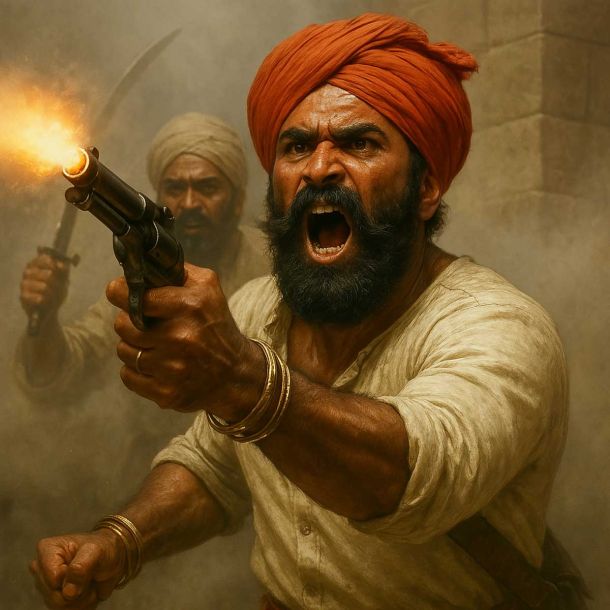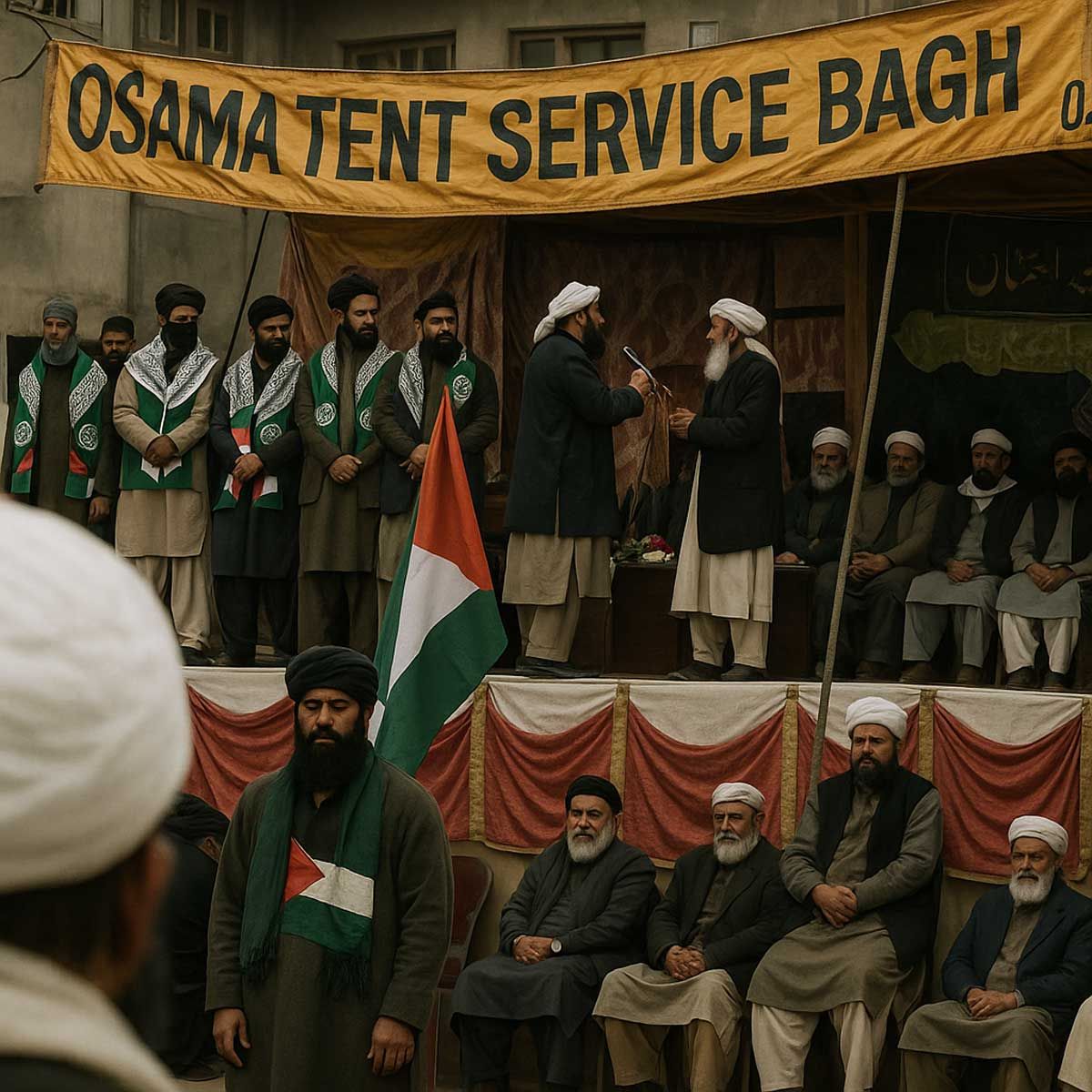Sanatan Articles
Satyaagrah
Written on
Satyaagrah
Written on
Satyaagrah
Written on
Satyaagrah
Written on
Satyaagrah
Written on
JOIN SATYAAGRAH SOCIAL MEDIA
"A foreign lady and the child born to her can never be faithful to the Nation": Word of Chanakya echoed when Nehru refused to allow Maharaja Yeshwantrao Holkar's only son Richard Holkar to succeed him as his mother and grandmother were Americans

The revelation of Jawaharlal Nehru's views, as quoted by Dinesh Trivedi, a former Congress MP from Gujarat, has sparked a significant debate regarding the qualifications of not only Congress President Sonia Gandhi but also her children Rahul Gandhi and Priyanka Gandhi to lead the government. Trivedi, now a spokesperson for the Trinamul Congress of Mamata Banerjee in Kolkata, has brought to light an incident involving Nehru, then President Babu Rajendra Prasad, and Home Minister Sardar Patel's refusal to entertain the desire of Maharaja Yashwantrao Holkar of Indore to designate his son Richard, born from his American wife, as his successor.
|
In a debate concerning foreign origins published in the Kolkata daily "The Telegraph," Trivedi recalls how Nehru, Prasad, and Patel made it unequivocally clear that a son born to a foreign wife could not inherit the Indore gaddi (throne). What unfolded next was unprecedented, as the traditional Hindu customs, precedents, and religious sanctions were seemingly disregarded. Instead of Richard, Usha Raje Holkar, the maharaja's daughter from his Hindu wife, was appointed as the successor to the ruler of Indore.
Trivedi highlights that while this rulership was largely symbolic, given that all states had merged into the Indian Union by then, Nehru did not permit even a nominal position of power to be inherited by a descendant of a foreign spouse. This event exemplifies Nehru's firm stance against the notion of foreign lineage claiming positions of authority within India.
|
Furthermore, Trivedi draws attention to another historical instance dating back to 324/23 BC, involving Chandragupta Maurya and his defeat of Alexander the Great's nominee, Seleucus. Trivedi recounts how the astute Chanakya (also known as Kautilya), a key figure in ancient Indian politics, orchestrated the marriage between Chandragupta and Seleucus' daughter Helen as a strategic move to prevent the Greeks from gaining influence in India.
However, Trivedi reveals that Chanakya laid down a significant condition in this union: No offspring of Helen would have the right to succeed or lay claim to the throne of Magadh, thus effectively prohibiting any foreign lineage from ascending to power.
Trivedi's references to historical events serve as a backdrop to shed light on Nehru's decision regarding Richard Holkar's succession and to highlight the precedence set by revered figures such as Chanakya in safeguarding Indian sovereignty from foreign influence. The underlying message is that the rejection of foreign lineage in positions of authority is deeply rooted in India's historical and cultural fabric.
These incidents, as presented by Trivedi, contribute to the ongoing discourse surrounding the qualifications and eligibility of leaders with foreign origins to hold significant positions of power within the Indian political landscape. The debates sparked by Nehru's refusal to accept Richard Holkar as his successor and the historical precedents cited by Trivedi reflect the complexity and sensitivity of issues related to heritage, lineage, and the integration of foreign elements into India's political framework.
Jawaharlal Nehru's refusal to accept Richard Holkar as a successor of the Holkar dynasty
Jawaharlal Nehru's refusal to accept Richard Holkar as a successor of the Holkar dynasty marks a significant event in Indian politics. Rooted in political dynamics and concerns over lineage, this decision had far-reaching consequences for the princely state of Indore and the wider political landscape of India. This article examines the intricate details surrounding Nehru's refusal, focusing on the complexities of Richard Holkar's foreign lineage and its implications for Indian politics.
The Holkar Dynasty
A Legacy of Princely Rule The Holkar dynasty's rule over the princely state of Indore spanned several centuries and left an indelible mark on the region's history. Under the reign of Yeshwant Rao Holkar II, Indore witnessed a golden period of development and modernization. Yeshwant Rao Holkar II, who ruled from 1926 to 1948, is credited with transforming Indore into a progressive and prosperous city.
He fostered strong ties with the British and established a cordial relationship, which contributed to the region's growth. During his reign, Indore experienced significant advancements in infrastructure, including the introduction of a commercial flight service between Indore and Mumbai in 1946. Furthermore, Yeshwant Rao Holkar II's visionary approach led to the establishment of the Maharaja Yeshwantrao Hospital, a leading medical institution in central India.
Richard Holkar's lineage and foreign background played a significant role in the events surrounding Jawaharlal Nehru's decision to reject him as his successor. Born to Maharaja Yeshwant Rao Holkar II and Maharani Euphamina Watt Crane, Richard Holkar had a unique heritage shaped by his foreign mother and grandmother.
His mother, Maharani Euphamina Watt Crane, hailed from the United States, bringing an American connection to the Holkar lineage. Meanwhile, Richard Holkar's grandmother, Maharani Sita Devi, was an Englishwoman, adding an English heritage to his lineage. This foreign connection within the Holkar dynasty's bloodline became a crucial factor in Nehru's decision-making process.
|
Nehru's Political Considerations
Jawaharlal Nehru, a prominent leader in the Indian National Congress and India's first Prime Minister, approached the issue of Richard Holkar's succession with a clear political perspective shaped by his vision for a modern, socialist India. Nehru's ideology centered on consolidating power within a unified nation and breaking away from the remnants of feudalism that existed in the princely states.
Nehru believed that the feudalistic system upheld by the princely order was incompatible with his progressive ideas for India's future. As a socialist and advocate for social justice, Nehru aimed to transform India into a nation where equality and democratic principles prevailed. He envisioned a country where power was not concentrated in the hands of a privileged few based on hereditary claims or feudal hierarchies.
In Nehru's view, the integration of the princely states into the democratic framework of India was crucial for realizing his vision. He sought to establish a centralized power structure that would ensure equal rights and opportunities for all citizens, irrespective of their backgrounds or lineage. Nehru's approach was influenced by his deep commitment to socialism, secularism, and the principle of meritocracy.
Nehru's rejection of Richard Holkar as his successor can be seen as a manifestation of his determination to dismantle feudalistic structures and consolidate power within a unified India. By refusing to accept Richard Holkar, Nehru aimed to send a strong message about the importance of merit, equality, and the need to transcend traditional hierarchies based on hereditary claims.
Nehru's Letter and the Fallout: Nehru conveyed his disapproval of Richard Holkar's claim to the Indore throne. Nehru emphasized the need to integrate the princely states into the Indian Union and outlined his vision of a democratic and egalitarian India. Nehru's refusal to accept Richard Holkar as his successor set off a chain of political reactions. It strained the relationship between the Indian National Congress and the princely rulers, as many princely states resisted the idea of merging their territories with the Indian Union. Nehru's decision also created divisions within the Congress party itself, with some members supporting his stance while others advocated for a more conciliatory approach.
Richard Holkar's Response: Richard Holkar, taken aback by Nehru's rejection, responded to the situation from his unique perspective. While Richard Holkar's foreign lineage could not be altered, he sought to defend the autonomy of the princely states within the Indian Union. Richard Holkar believed in preserving the rich cultural heritage and historical significance of the princely order, even as India transitioned into an independent nation. His perspective reflected the concerns of many princely rulers who wished to maintain their distinct identities while being part of the larger democratic framework.
Political Implications and Negotiations: Nehru's refusal to accept Richard Holkar as his successor had significant political implications. It sparked debates and discussions on the role of princely states in the newly independent India. The issue of integrating princely states into the democratic framework and balancing tradition with modernization became a central point of contention. Negotiations ensued between Nehru, Richard Holkar, and other princely rulers to find a compromise that would address their concerns while aligning with Nehru's vision of a unified India. These negotiations aimed to strike a delicate balance between preserving cultural identities and establishing a centralized power structure.
The Legacy of the Event: The events surrounding Nehru's refusal to accept Richard Holkar as his successor left a lasting impact on the political landscape of India. Nehru's decision emphasized the tension between his political ideology and the complexities of princely lineage. It paved the way for the integration of princely states into the Indian Union, further solidifying the centralized power structure that Nehru envisioned. The episode served as a significant milestone in the post-independence era, shaping the political dynamics and reinforcing the dominance of the central government in the princely states' affairs.
Jawaharlal Nehru's refusal to accept Richard Holkar as his successor represented a pivotal event in Indian politics. Driven by political considerations and concerns over lineage, Nehru's decision reflected his vision of a unified, modern India. The episode triggered debates on the role of princely states and their integration into the democratic framework, highlighting the challenges of balancing tradition and modernization. Ultimately, it played a crucial role in shaping the post-independence political landscape of India, solidifying the centralized power structure and setting the course for the integration of princely states into the Indian Union.
References:
 Support Us
Support Us
Satyagraha was born from the heart of our land, with an undying aim to unveil the true essence of Bharat. It seeks to illuminate the hidden tales of our valiant freedom fighters and the rich chronicles that haven't yet sung their complete melody in the mainstream.
While platforms like NDTV and 'The Wire' effortlessly garner funds under the banner of safeguarding democracy, we at Satyagraha walk a different path. Our strength and resonance come from you. In this journey to weave a stronger Bharat, every little contribution amplifies our voice. Let's come together, contribute as you can, and champion the true spirit of our nation.
 |  |  |
| ICICI Bank of Satyaagrah | Razorpay Bank of Satyaagrah | PayPal Bank of Satyaagrah - For International Payments |
If all above doesn't work, then try the LINK below:
Please share the article on other platforms
DISCLAIMER: The author is solely responsible for the views expressed in this article. The author carries the responsibility for citing and/or licensing of images utilized within the text. The website also frequently uses non-commercial images for representational purposes only in line with the article. We are not responsible for the authenticity of such images. If some images have a copyright issue, we request the person/entity to contact us at This email address is being protected from spambots. You need JavaScript enabled to view it. and we will take the necessary actions to resolve the issue.
Related Articles
- Lets take a new year resolution together to liberate Bharatiya history from the paws of colonial effect
- Northeast is not the Part of Pakistan because of 'Netaji': Subhas Bose and the ‘special’ case of Assam
- Ghost from the past: Unseen picture of Nehru voting in favour of partition of India goes viral
- The perpetrator of the Jallianwala Bagh massacre General Reginald Dyer was forgiven by Mohandas Gandhi as an exercise of forgiveness or love to nurse Dyer back to life if he was suffering from a physical malady
- Godse's speech and analysis of fanaticism of Gandhi: Hindus should never be angry against Muslims
- Historian with Communist glasses: When Pandit Nehru rose to unrivalled power and position in India his book 'Glimpses of World History' was recommended as a reliable reference work for advanced students of history in Indian universities
- Mysterious death of Pandit Deen Dayal Upadhyaya, whose growing popularity was a threat to Congress
- How Nehru had laid blue print of Indira Gandhi inheriting his PM post
- When Nehru ignored warnings from Sardar Patel and Sri Aurobindo and shocked USA President: Chinese Betryal and loss of centuries old ally
- Father of the Nation! Absolutely not. Mohandas Karamchand Gandhi was not the father of the nation either officially or otherwise
- British author Tunku Varadarajan tried to tarnish the image of iconic freedom fighter Netaji with reference to Hitler: Sinister agenda to malign the legacy of Netaji from calling him a ‘flawed hero’ to a ‘Nazi sympathiser’
- Can Communism and Democracy Coexist - 100 Years of Russian Revolution
- A Great man Beyond Criticism - Martyrdom of Shaheed Bhagat Singh (Some Hidden Facts)
- During ‘Kheti Bachao Yatra’ in Kurukshetra Shehjada Gandhi claimed of throwing China out from Indian Territory ‘in 15 minutes’: From Nehru’s Himalayan blunder to UPA’s silence as China took over Indian land in Ladakh
- Nehru lost election and became first Prime Minister of free India: All thanks to miraculous Gandhi





















